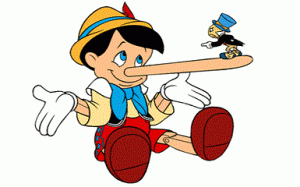- January 23, 2019
- 1:42 pm
- Al Gini
- no comments
The Nature of Lying
Whether you are a supporter or a critic of Mr. Trump, an undeniable reality is that Mr. Trump often confuses fact and fiction, opinion and objectivity, truth and non-truths. So, in the hopes of achieving political and philosophical clarity the following is on the nature of lying. I hope this helps!
Lying, to lie, to tell a falsehood, to fib, to intentionally create the wrong impression, to misrepresent the facts, to remain silent, to deny, to misinform: To Be a Liar. Perhaps the best way to approach this topic is to simply concentrate on the personalist concept of lying. That is: “One who intentionally and knowingly does not tell the truth about himself, others, facts, and/or situations.”
Function or Purpose:
In asking ourselves what does lying do, we find that, first of all, lying attempts to deny a truth. Secondly, lying often tries to expand the truth. That is, the “tall tale or yarn.” Third, lying can be an attempt to claim something that is not. Fourth, lying very often hides the truth so as to avoid overtly denying it. Finally, lying can distort the truth or make a truth dependent on other facts so as to deny the truth as it is.
Now, while this list is by no means exhaustive, it does give one a handle on the function of lying. At the very least lying: denies, expands, falsely creates, hides and distorts. We now know what it does, but the larger question remains: Why do people do it?
Why We Lie:
Is it enough to say that a person lies to cover up a truth he/she does not wish to admit? Or that a person lies to make something more than it really is? Or that one lies to better oneself in some way? While these three categories may be the most obvious reasons for lying there is, I think, one specific cause which underlies all the other reasons for lying. A cause that is sometimes conscious, unconscious, or even habitual, but whatever its mechanism or regularity there is at bottom only one cause: FEAR! One lies from the fear that one may not be otherwise accepted. Fear that one is not enough as one is. Fear that unless we lie, we will not be interesting enough. Fear that unless we distort or embellish the truth we will not be considered part of the situation or relationship. Fear that the simple truth is not enough for the situation. Or worst of all, fear that the truth (whatever it is) will not be accepted.
Obviously this fear is a by-product of a person’s lack of self-esteem and true worth. Unfortunately, most people predicate their own selfhood on what other people think of them, rather than what they know and feel about themselves. Therefore, making a good impression, being accepted as a “good ol’ boy”, being respected by others is a sine qua non condition for personal self-esteem. So then, if others are the ground of self, why not embellish on the truth if the result will be the admiration of others and admiration for self? A lie after all seems a small price.
Fear and its child lying manifests itself in various forms. Spontaneous lying: brought on by B.S. sessions or humor. Planned lying: consciously done to achieve some effect for personal or professional reasons. Humane lying: the lie that is done in order not to hurt another e.g. “White lie.” Habitual lying: semi-automatic or unconscious lying for whatever reasons. That is, a person who always lies or embellishes out of habit. Desperation lying; lying because there is a truth that one cannot admit. Dramatic lying: lying to create an effect or set a scene/scenario. Malicious lying: lying intended to hurt another.
All of these forms of lying lead us to the same conclusion: lying is basically the fear of inadequacy, compounded by the real or imagined pressures of normal as well as stressful social intercourse.
Reasons Against Lying:
Given the rather complicated personal/social reasons involved in the act of lying, are there sufficient reasons for not lying? It is certainly not enough to say one should not lie for theological reasons, with its arguments from authority, because this sanction is easily outweighed by the pressures of social contract and the obvious benefits of lying. The same holds true for ethical (philosophical) sanctions, at least prima facie. Even at the psychological level, it is difficult to see the benefits of not lying, especially if one does have a low identity quotient.
However, what all three of these categories have in common (the theological, ethical/philosophical, and psychological) is that they are concerned with the essential unity of the person. It is here that I believe we can find at least one valid reason for not lying. That is, at the reason of practical integrity.
Integrity means the harmonious placements of all the parts of whole in a balanced way, so that the parts allow the whole to function properly, efficiently, or well. To have integrity as a person is essentially to lead a balanced life uncomplicated by an excessive number of glaring and destructive internal contradictions. That is to say: to lead a life of integrity means that one leads a coordinated life, with all of its various ramifications, consistent with one’s basic beliefs or philosophy.
Now, practically speaking, to lie is to destroy one’s internal consistency and slowly negate the very concept of personal integrity. To esteem a cause or virtue such as authentic as selfhood, but to lie to oneself about oneself and the situation around us, is to act in contradiction to one’s goals. To lie to others dominates both out own internal honesty and balance and it prohibits others from authentically relating to you. When you lie about yourself, and people believe you, then what they may like in you is what you have lied about, not what you really are. Also he/she who lies and is found out by others loses his/her credibility. So even when he is honest, who believes him? Who even cares? Moreover, is it not simply too damn difficult to lie? One must always remember how and when one lied to whom, otherwise one looks the fool!
Somehow, the bottom line is that to live in truth may be boring, less than romantic and exciting, and certainly less than continuously glamorous and moving, but it is what we are. And what we are (good or bad) is really all we have to give. Yes, we can, through effort and scenario, be more than we are. But, it is real only if it is honestly attained, not merely the thin film of imagery and illusion. Who we are is all we have, and to be authentically and honestly esteemed, loved, liked, and accepted, we must present ourselves truthfully. Yes, it is hard to be rejected by a few or many or even one, but such is life. Not to be honest with oneself and others is never to be oneself. Strangely, in lying to achieve love, one is not loved, one’s lie or image is loved while the real man goes undetected by his lover as well as himself.

